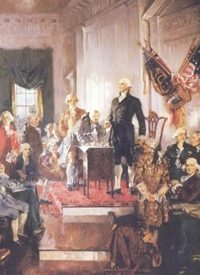
Christine O’Donnell has come under criticism for stating that the language of the Constitution has nothing specific about the “separation of church and state.”
The phrase was popularized by Thomas Jefferson, a “Founding Father,” but not one who was involved in drafting the Constitution. Most of us who actually read the short, clear document that is the foundation of our government know that what the First Amendment does is prohibit Congress from establishing any particular religion.
The Founding Fathers assumed that government would be very limited, which is why the nearly all the enumerated powers of Article I are so specific and the “necessary and proper" clause at the end of the list of enumerated powers relates only to those functions mentioned before, like establishing postal roads or setting standard weights and measurements. Why are there no restrictions in Article II or Article III, which deal with the executive and judicial branches respectively? Because the function of those branches was not to set federal policy or law, but only to carry out those laws passed by Congress.
So the Constitution says nothing about the president proclaiming a national religion or about the Supreme Court finding that America has a national religion. The federal government was intended to be a minor — a very minor — part of our system of government. State legislatures, which originally chose senators and which still, on paper, decide how presidential electors are chosen, were given the lion’s share of governmental power as an absolute check on a rogue federal government.
The Civil War and the rise of “progressives” led to the notion that our governmental system must be absolutely uniform throughout all the land. This would have made the Founding Fathers spin in their graves. At the time the Constitution was adopted, half the states had established state churches. This status ended without reference at all to the First Amendment (which limited only federal power), but by reliance upon the will of the people of these various states.
Likewise the Constitution nowhere grants any individual the right to free speech, free assembly, or free press. It says rather that “Congress shall make no law…” concerning those areas of liberty. State governments had unlimited authority to restrict the press, to limit speech, and otherwise to limit individual liberty. It is a testament to the rewriting of history that we have come to assume that if the federal government did not protect our liberties, we would have no liberties at all. In fact, long before the Constitution was adopted, individual states enacted their own bills of rights which are, more or less, similar to the federal Bill of Rights. But it was state liberty that preceded federal liberty, not the other way around.
Now we have reached the point where the Supreme Court arbitrates how the Constitution — through mythical “incorporation” of the due process clause of the Fourteenth Amendment, which does apply to the states — permits state governments to do this or that. Instead of the simple language of our foundational document, which Christine O’Donnell correctly notes says nothing about separation of church and state — nothing about state governments at all — and which relates only to a power denied Congress, the pundits of progressive thinking rely upon federal judges, our new lords and kings, to declare what ordinary words really mean. It is almost as if our Founding Fathers had written the liberating documents of American life in Sanskrit and deferred all answers on meaning to an anticipated caste of Brahmins.
Read also: O’Donnell’s ‘Gaffe’ on the First Amendment



